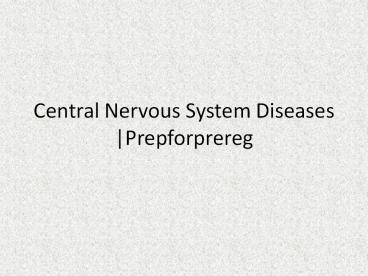CNS Diseases | Pharmacy News UK | Prepforprereg
Title:
CNS Diseases | Pharmacy News UK | Prepforprereg
Description:
Prepforprereg provides the recent news about pharmacy like CNS diseases which includes Insomnia, Migraine, Depression, Anxiety and many more which helps you to understand things deeply. For more info go to –
Number of Views:12
Title: CNS Diseases | Pharmacy News UK | Prepforprereg
1
- Central Nervous System Diseases Prepforprereg
2
What are CNS Diseases ?
- The Central Nervous System is a very important
part of the nervous system which consists of
spinal cord and the brain. It is so named because
it integrates information it receives from, and
coordinates and influences the activity of, all
parts of the bodies of bilaterally symmetric
animalsthat is, all multicellular animals
except sponges and radially symmetric
animals such as jellyfishand it contains the
majority of the nervous system. Diseases of any
component of the brain (including the cerebral
hemispheres, diencephalon, brain stem, and
cerebellum) or the spinal cord. CNS diseases are
also known as CNS disorders.
3
(No Transcript)
4
- Here is a list of types of CNS diseases. The
following list includes - Insomnia
- Depression
- 3. Anxiety
- 4. Migraine
5
Insomnia -
- Insomnia is a sleeping disorder in which people
face trouble in sleeping. They may have
difficulty falling asleep, or staying asleep as
long as desired.23 Insomnia is typically
followed by daytime sleepiness, low energy,
irritability, and a depressed mood. - Symptoms
- Difficulty in falling asleep.
- Waking up too early in the morining
- Daytime tiredness or sleepiness
- Ongoing worries about sleep
- Irritability and problems with concentration
during daytime
6
(No Transcript)
7
- Types Of Insomnia
- Primary insomnia - problem is not associated with
other health complaints (e.g. anxiety) - Secondary insomnia - problem is associated with a
condition, medicine, or ingested food/drink - Self Help Tips to Improve Insomnia
- Exercise regularly but do not do so within 4
hours of bedtime. - Dont eat just before bed.
- Limit caffeine, alcohol, and nicotine.
- Stick to a regular sleep schedule.
8
Depression -
- Depression is a mood disorder causing a
persistent feeling of sadness and loss of
interest. Depression is a state of low mood and
aversion to activity that can affect a person's
thoughts, behavior, feelings and sense of
well-being. - Symptoms
- Feeling guilty
- Feeling helpless
- Sleep disturbances
- Lack of interest or motivation
- Self harm and/or suicidal ideation
9
(No Transcript)
10
- Treatment of Depression
- Counselling allows patients to talk through
their problems with trained professionals and
formulate a plan to overcome them. - Cognitive behavioural therapy aims to alter the
way a patient thinks and in doing so allows
patients to identify patterns of behaviour or
thoughts that may be precipitating symptoms of
depression and alter them accordingly. - Drug treatment options include SSRIs, MAOIs,
tricyclic antidepressants etc. There is little to
choose between the different classes of
antidepressants in terms of efficacy but SSRIs
are safer in overdose and have a more favourable
side effect profile than the other classes of
antidepressants so should be considered first
line for treatment of depression
11
Anxiety -
- Anxiety is a feeling of worry, unease, or
nervousness about something with an uncertain
outcome or fear of current events. It is a
natural response to danger and can be a positive
feeling but constant anxiety can be overwhelming
and have a negative impact on health,
relationships etc. There are several types of
anxiety disorder including general anxiety
disorder, post traumatic stress disorder, social
anxiety disorder, obsessive-compulsive disorder,
and phobias.
12
(No Transcript)
13
- Symptoms
- Sweating
- Muscle Tension
- Headaches
- Difficulty in concentrating
- Some people who suffer anxiety may also suffer
from panic attacks. These episodes are associated
with he following symptoms - Dizziness
- Nausea
- Stomach Cramping normally
- Difficulty in breathing normally
14
- Self help tips to improve anxiety
- Exercise regularly
- Eat healthy diet
- Undertake relaxation techniques
- Seek assistance, support and advice from
appropriate healthcare professionals, support
groups - Remove stress triggers
15
Migraine -
- Migraine is a kind of a headache of varying
intensity, often accompanied by nausea and
sensitivity to light and sound. Migraine is
a primary headache disorder characterized by
recurrent headaches that are moderate to
severe.1 Typically, the headaches affect one
half of the head, are pulsating in nature, and
last from two to 72 hours. - Symptoms
- throbbing headache that often affects one side of
the head and is worse when moving - Nausea vomiting
16
(No Transcript)
17
- Perspiration
- Visual disturbance
- Pale colour
- About 20 of migraine sufferers will experience
aura - this is usually the first sign of a
migraine attack. Aura symptoms mainly include
visual problems such as blurred vision, flashing
lights, zigzag patterns, or blind spots.
Additional aura symptoms include slurred speech,
and numbness or tingling sensation in arms, legs
or face.
18
- Treatment
- Lie down in a dark, quiet room. Sleeping often
helps - Analgesics e.g. aspirin, paracetamol, co-codamol
- Antiemetics - e.g. buclizine
- 5-HT1 receptor agonists (aka the triptans) -
sumatriptan is available over the counter for
treatment of migraine attack - Causes
- Still poorly understood
- Originally thought that dilatation of blood
vessels in the brain was responsible for migraine
symptoms but this a highly debated and evidence
is lacking - Symptoms are instead now thought to occur due to
abnormal brain activity that interferes with
nerve transmission, neurotransmitters and blood
vessels in the brain
19
For more info go to www.prepforprereg.co.uk
20
Thanks for watching ! ?































